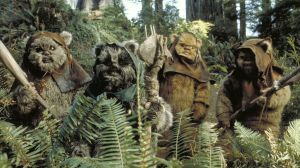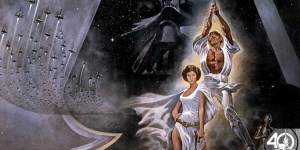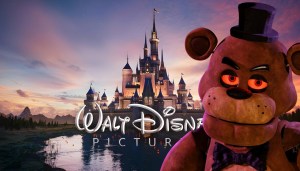Between the underwhelming reactions to the previous film, Fantastic Beasts: The Crimes of Grindelwald, and the growing backlash to real-life figures involved in the franchise, which resulted in a major character being recast, odds surely aren’t in the favor of Fantastic Beasts: The Secrets of Dumbledore earning acclaim. Being the halfway point of the planned five-film series, the fate of the series surely isn’t riding on the success of this film, as the Wizarding World has enough of a following to guarantee the completion of this prequel narrative, but Secrets of Dumbledore could surely kill any interest among audiences if it’s as disappointing as its predecessor. Luckily, this film manages to course-correct the narrative enough to evoke excitement in the characters and what the future might hold for them, even if it’s still a far cry from the success of the proper Harry Potter series, as it invests more into its characters than its predictable premise.
Videos by ComicBook.com
With the help of allies Credence (Ezra Miller) and Queenie (Alison Sudol), Grindelwald (Mads Mikkelsen) is hoping to make a play to earn political power in the wizarding community, going to great lengths to manipulate his future and those around him. Meanwhile, Dumbledore (Jude Law) is unable to directly combat Grindelwald, instead entrusting Newt (Eddie Redmayne), Newt’s brother Theseus (Callum Turner), and muggle Jacob (Dan Fogler) to stop his former love before it’s too late.
One of the biggest challenges a series of prequel films can face is balancing the stakes of a storyline. The first two films in the Fantastic Beasts series teased a battle between wizards and muggles, potentially seeing those without mystical abilities being wiped out. However, given that we witnessed in the Harry Potter films that this plan didn’t succeed, it’s difficult to invest in its outcome. It’s a similar relationship to the one between The Hobbit films and The Lord of the Rings trilogy, whereas the original Star Wars trilogy focused on specific figures and how they factored into an overall war, which allowed the prequel trilogy to focus on characters over conflict. Secrets of Dumbledore seemingly understood this path towards success, as we get much more time spent unraveling the layers of each character in the ensemble as opposed to merely exploring how the fate of the world was hanging in the balance, which — shockingly — now sees us actually caring about these characters.
It feels like a film giving us characters with multiple layers shouldn’t necessarily be worth celebrating, but given how one-dimensional and uninteresting all of the characters felt in previous installments, it comes as a shock to actually invest in their outcomes. Previously, they merely felt like cogs in a machine that were required just to move the franchise vehicle forward, while Secrets of Dumbledore finally feels like it reevaluated what it needed to fulfill for the overall story, and that reevaluation actually pays off.
A key in the movie’s successful course-correction comes within its first 15 minutes, merely by fully delivering on its title. “Fantastic Beasts and Where to Find Them” felt like a highly specific title, though it entirely factored into the outcome of that debut film, resulting in some confusion among fans about why the series continued using the “Fantastic Beasts” title. However, this third entry features a truly heartbreaking opening sequence in which Newt seeks a specific creature, one that factors into the overall narrative, while we see a variety of other beasts that tie into the plot over the rest of the narrative. Also within the opening scenes of the movie, Dumbledore and Grindelwald share a conversation that helps inform the entire rest of the plot, which includes the former revealing key facets of his character. In other words, audiences are given both Fantastic Beasts and The Secrets of Dumbledore in its opening scenes, setting the stage for the entire endeavor, with the story being all the better for it.
As any Harry Potter fan can tell you, the arrival of each book or movie brought with it the introduction of new characters, many of which wouldn’t stick around for the next outing, making it inherently difficult to care about characters who might prove to be irrelevant. The filmmakers behind Fantastic Beasts have clearly identified the strengths and weaknesses of both the characters and the performers behind them, thrusting Law’s Dumbledore and Turner’s Theseus to the forefront in service of the story, while Miller’s Credence and even Redmayne’s Newt have the narrative momentum taken off of their shoulders. Everyone feels used to their full potential and none of the characters feel arbitrary or forced into the spotlight, also allowing other characters to fade more into the background and be used more sparingly.
Fans and non-fans alike will surely be curious to see how Mikkelsen’s performance compares to Johnny Depp’s interpretation of Grindelwald, with the narrative itself never addressing the wizard’s change in appearance. Whether you loved or hated Depp’s performance, what works best in Mikkelsen’s favor is how subtle and subdued his interpretation is, relying more on a quiet menace than exaggerated intimidation. Even Mikkelsen’s physical appearance in the film is a more nuanced take of the antagonist, marking an effective transition from one performer’s take on a character to the current actor.
While Secrets of Dumbledore is surely an effective revival of the series and a definitive improvement from what came before it, it had to dig itself out of such a pit left by the previous installment, it still only ever manages to be mediocre. Given how much it had to correct itself, the movie feels more like an introduction to these characters than the third entry in their journey, requiring audiences to relearn the entire adventure, the stakes of which still feel lower than what was seen in the Harry Potter franchise. Seeing an entirely different era in history and the inherent otherworldly events unfolding means a lot of scenes that are under-lit or under-saturated, making for a visual palette that lacks charm and whimsy. These aesthetic choices surely felt appropriate for director David Yates’ work on the back half of the Potter franchise, but with Fantastic Beasts, the cinematic style lacks the joy audiences likely were hoping to see in this series, with the characters themselves feeling just as flat as the sepia-toned late ’20s time period.
The bar feels so low for the Fantastic Beasts franchise, that even by being an inoffensive exploration of the Wizarding World that moves by relatively painlessly feels like a victory, especially thanks to finding the right chemistry between all of the characters to make the adventure feel organic. Toss in some direct connections to Hogwarts itself while also elucidating on Dumbledore’s background, and you have what is likely the best entry into this franchise yet, even if there’s still a lot of work to be done.
Rating: 3 out of 5
Fantastic Beasts: The Secrets of Dumbledore hits theaters on April 15th.








